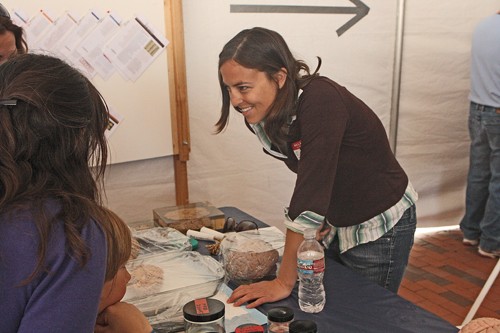Tucson is living proof that the written word isn’t dead.
Just ask the 80,000 people who, according to the organizers’ initial estimates, attended last month’s Tucson Festival of Books.
Organizers attribute some of this year’s success to interest generated in 2009.
“”People who didn’t make it last year flocked this year to see what all the buzz was about, and the people who did experience it in 2009 were really enthusiastic about it and wouldn’t have missed it,”” said Helene Woodhams, co-chair of the Author Committee.
The festival, in its second year, grew an astounding amount, both in attendance — last year’s numbers hovered around 50,000 — and in community interest and involvement. More than 450 authors from a wide array of genres flocked to Tucson to give workshops and readings and engage in discussion with other writers. The number and variety of authors was greater this year, proving that the festival has made a place for itself on the literary map.
The festival has been compared to the Los Angeles Times Festival of Books, billed as “”America’s largest literary event”” on its Web site. Though this year’s Los Angeles festival is still upcoming — it will take place April 24-25 on the UCLA campus — the annual event usually draws crowds of 130,000 or more. Considering Tucson’s small-town feel compared to Los Angeles, 80,000 festivalgoers is impressive for the Old Pueblo.
Many participating authors, organizers and attendees agree: this year’s fair was a resounding success.
Chris Impey, a UA distinguished professor of astronomy and the author of a myriad of popular books, textbooks and articles on astronomy and cosmology, participated in the festival. He said that his panel discussion on the interface between science and science fiction was well-attended with about 50 people present. He was surprised that all the festival’s events, lectures and discussions generated sizeable audiences, even the more obscure talks. “”I didn’t see many sparsely attended things,”” he said.
Impey was also impressed by festivalgoers’ willingness to participate in discussions. “”There were a ton of questions. We ran out of time before we got to them all,”” he said of his panel discussion.
Overall, the visiting authors were impressed by this year’s festival, Woodhams said.
“”Authors loved it!”” she said. “”They loved Tucson, loved the weather and loved the thousands of people who came out to the festival. Many of them commented on the amazing organization, and said they’d never seen anything like it. Not one could believe this was only the festival’s second year.””
While Tucson may seem an unlikely place for such a massive celebration of the written word, the festival is a tribute to the city’s culture and involvement.
“”Tucson’s a good example of the fact that books are not dead,”” Impey said. “”It might not be as high-cultured a place as New York or so on, but people are still reading.””
John Humenik, publisher and editor of the Arizona Daily Star and one of the festival’s founders, chalked up the festival’s success to the partnership with the UA, the variety of sponsors and vendors, enthusiastic volunteers, promotion from the Daily Star and Tucson’s famously beautiful weather.
But the most important factor, Humenik stressed, was the visiting authors.
“”The number of best-selling authors and the variety of topics covered makes the difference. We can only be successful if the authors are available and find great value in their experience here in Tucson. They are the attraction,”” he said.
Luckily for Tucson, more than 450 authors trekked to the desert for the festival, a fact that delighted lovers of literature. “”We know their fans — and there are many — are thrilled by the access they get to the authors during the festival,”” Humenik said.
Paige Wheeler, a creative writing junior and self-avowed bookworm, attended both days of the festival and left only because she had to “”tear (herself) away for work.””
“”I love it. I’m a nerd,”” Wheeler said.
Though some UA students and Tucson locals feel ambivalent about Tucson, seeing it as a Podunk desert town, the Tucson Festival of Books suggests otherwise.
“”The success of the festival proves that Tucson is not entirely a backwards, primitive village,”” Wheeler said.









